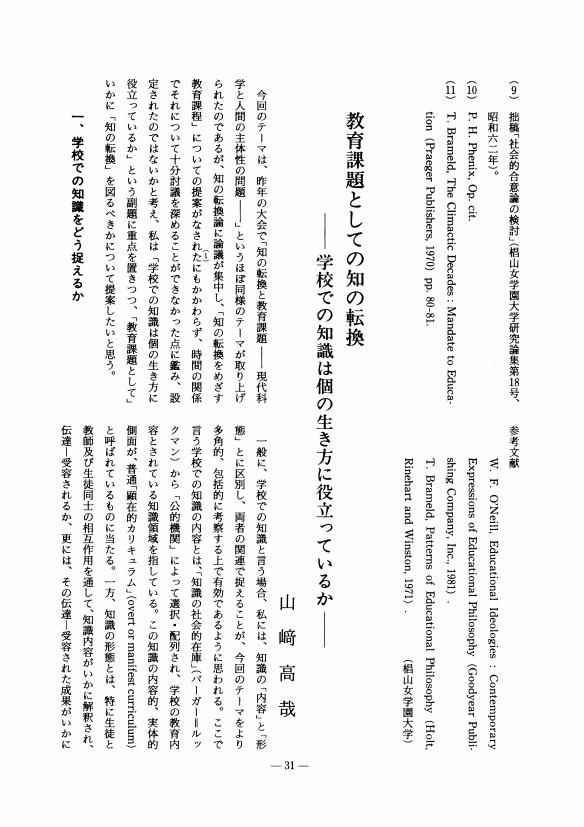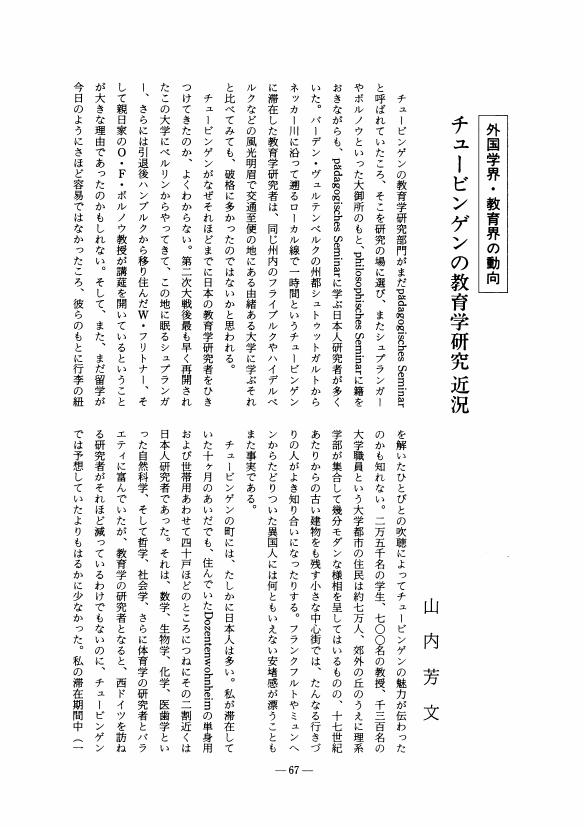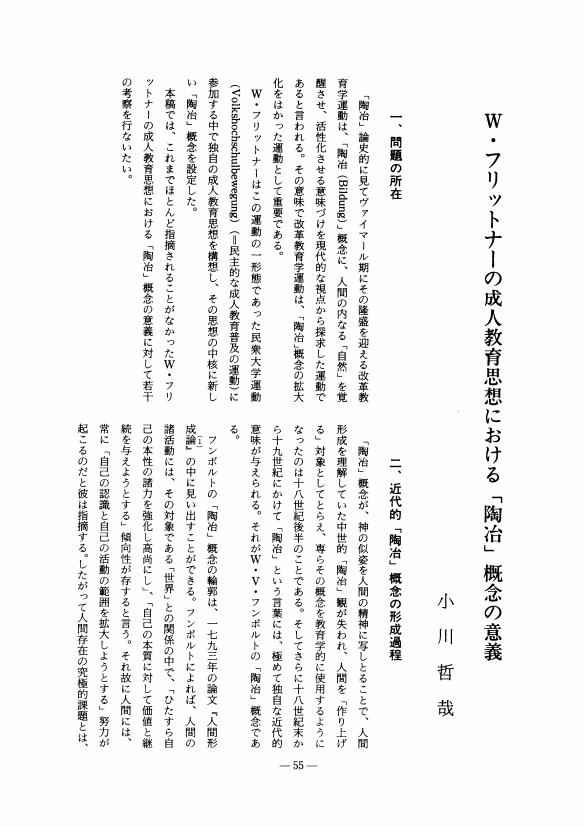- 著者
- 相良 敦子
- 出版者
- 教育哲学会
- 雑誌
- 教育哲学研究 (ISSN:03873153)
- 巻号頁・発行日
- vol.1991, no.63, pp.20-25, 1991-05-10 (Released:2010-01-22)
- 参考文献数
- 16
1 0 0 0 OA 教育課題としての知の転換 学校での知識は個の生き方に役立っているか
- 著者
- 甲斐 進一
- 出版者
- 教育哲学会
- 雑誌
- 教育哲学研究 (ISSN:03873153)
- 巻号頁・発行日
- vol.1991, no.63, pp.26-31, 1991-05-10 (Released:2009-09-04)
- 参考文献数
- 13
1 0 0 0 OA 教育課題としての知の転換 学校での知識は個の生き方に役立っているか
- 著者
- 山崎 高哉
- 出版者
- 教育哲学会
- 雑誌
- 教育哲学研究 (ISSN:03873153)
- 巻号頁・発行日
- vol.1991, no.63, pp.31-36, 1991-05-10 (Released:2009-09-04)
- 参考文献数
- 12
1 0 0 0 OA 課題研究に関する総括的報告
- 著者
- 毛利陽 太郎
- 出版者
- 教育哲学会
- 雑誌
- 教育哲学研究 (ISSN:03873153)
- 巻号頁・発行日
- vol.1991, no.63, pp.36-41, 1991-05-10 (Released:2009-09-04)
1 0 0 0 OA 垣内松三における国語教育科学の構想
- 著者
- 戸田 功
- 出版者
- 教育哲学会
- 雑誌
- 教育哲学研究 (ISSN:03873153)
- 巻号頁・発行日
- vol.1991, no.63, pp.42-53, 1991-05-10 (Released:2009-09-04)
- 参考文献数
- 23
This paper aims at clarifying the conception of Matsumi Kaitô to construct a theory of language education.Constructing a theory of language education was the aim and the end of his studies in language education. He turned his attention to the reality of language education and treated it from a methodological viewpoint in order to construct a systematic theory of the science of language education. The viewpoint of the reality of language education forms an essential element in Kaitô's theory. He arranged all theories of language education into two types, theories based on the reality of language education and normative theories of language education.Kaitô's conception aims at reexamining the methods of studying language education by applying two methodological viewpoints. The viewpoint of the reality of language education is constructed in cnnection with these two categories of viewpoints, on the one hand the viewpoint of relation, on the other hand the viewpoint of culture which looks at reality in the light of culture.The construction of Kaitô's conception is guided by the following views on the reality of language education : First, the problem is stated from the viewpoint of the reality of language education; secondly the fields of study are determined by stating the problems. Each field corresponds to one volume of Kaitô's “Independent Lectures.” Examining these we discovered two mistakes : (1) The viewpoint is not sufficiently applied; (2) Kaitô regards the reality of language classes as the reality of language education. Because of these mistakes, the construction of Kaitô's conception contradicts his original aim. However, Kaitô's conception is still valuable in the sense that it takes the reality of language education as a viewpoint. Yet, we should reexamine the viewpoint and the methods of studying language education and try to construct a new systematic theory of language education.
- 著者
- 野平 慎二
- 出版者
- 教育哲学会
- 雑誌
- 教育哲学研究 (ISSN:03873153)
- 巻号頁・発行日
- vol.1991, no.63, pp.54-65, 1991-05-10 (Released:2010-05-07)
- 参考文献数
- 25
The modern world, emerging by a process of rationalization which is characterised as the 'delivery from magic through reason', emphasizes the turn from blind obedience to authority to the autonomy of the subject. In that sense, the modern world can be described as an 'educational project'. But today, because of its inherent ambivalence, the modern world, rather than being looked upon in a positive way, frequently becomes the object of a critical evaluation and pointing to the loss of the meaning of life and the loss of liberty, education centered on reason seems to be no longer possible.Contrary to this, there is the German philosopher J. Habermas, as one of those theorists who on the basis of a philosophy of 'linguistic turn' reexamine the concept of reason from the viewpoint of 'communicative reason' and thus foster the idea of an enlightened modern world. This paper tries to understand Habermas' philosophical accomplishments as a questioning of the basic background of a modern pedagogy; it attempts a new approach of an enlightened Consciousness based on the concept of 'communicative reason' and of educational thought.
1 0 0 0 OA 道徳教育の原理的考察 ルソー・カントの思想にたちかえって
- 著者
- 横山 れい子
- 出版者
- 教育哲学会
- 雑誌
- 教育哲学研究 (ISSN:03873153)
- 巻号頁・発行日
- vol.1990, no.62, pp.61-66, 1990-11-10 (Released:2009-09-04)
- 参考文献数
- 8
1 0 0 0 OA チュービンゲンの教育学研究近況
- 著者
- 山内 芳文
- 出版者
- 教育哲学会
- 雑誌
- 教育哲学研究 (ISSN:03873153)
- 巻号頁・発行日
- vol.1990, no.62, pp.67-71, 1990-11-10 (Released:2009-09-04)
1 0 0 0 OA 西ドイツ・ケルン滞在報告 (一九八二年から一九八九年)
- 著者
- 鈴木 晶子
- 出版者
- 教育哲学会
- 雑誌
- 教育哲学研究 (ISSN:03873153)
- 巻号頁・発行日
- vol.1990, no.62, pp.72-77, 1990-11-10 (Released:2009-09-04)
1 0 0 0 OA 増渕幸男著『ヤスパースの教育哲学研究』
- 著者
- 田代 尚弘
- 出版者
- 教育哲学会
- 雑誌
- 教育哲学研究 (ISSN:03873153)
- 巻号頁・発行日
- vol.1990, no.62, pp.78-82, 1990-11-10 (Released:2009-09-04)
- 著者
- 鈴木 美南子
- 出版者
- 教育哲学会
- 雑誌
- 教育哲学研究 (ISSN:03873153)
- 巻号頁・発行日
- vol.1990, no.62, pp.83-87, 1990-11-10 (Released:2009-09-04)
1 0 0 0 OA 教育における合理主義と非合理主義 「近代学校」と合理主義
- 著者
- 俵木 浩太郎
- 出版者
- 教育哲学会
- 雑誌
- 教育哲学研究 (ISSN:03873153)
- 巻号頁・発行日
- vol.1991, no.63, pp.1-4, 1991-05-10 (Released:2009-09-04)
1 0 0 0 OA 教育の合理主義的理解とは何か
- 著者
- 宮寺 晃夫
- 出版者
- 教育哲学会
- 雑誌
- 教育哲学研究 (ISSN:03873153)
- 巻号頁・発行日
- vol.1991, no.63, pp.4-10, 1991-05-10 (Released:2009-09-04)
- 参考文献数
- 8
1 0 0 0 OA 教育哲学を考える
- 著者
- 原 聡介
- 出版者
- 教育哲学会
- 雑誌
- 教育哲学研究 (ISSN:03873153)
- 巻号頁・発行日
- vol.1990, no.61, pp.77-78, 1990-05-10 (Released:2009-09-04)
1 0 0 0 OA 能勢榮譯註『莱因氏教育學』底本攷
- 著者
- 岡本 英明
- 出版者
- 教育哲学会
- 雑誌
- 教育哲学研究 (ISSN:03873153)
- 巻号頁・発行日
- vol.1990, no.61, pp.79-82, 1990-05-10 (Released:2009-09-04)
- 参考文献数
- 7
1 0 0 0 OA ヘルバルト教育学における趣昧判断の位置づけ
- 著者
- 浜田 栄夫
- 出版者
- 教育哲学会
- 雑誌
- 教育哲学研究 (ISSN:03873153)
- 巻号頁・発行日
- vol.1990, no.62, pp.16-31, 1990-11-10 (Released:2010-01-22)
- 参考文献数
- 49
It is very important to consider Herbart's educational thought in connection with aesthetic judgement. The notion of taste is not only one of the central ideas in Herbart's pedagogy, but also an important notion in pedagogy as a whole.In the course of the development from “The Aesthetic Presentation of the Universe as the Chief Office of Education” (1802) to “General Principles of the Science of Education Deduced from its Aim” (1806), it looks as if the viewpoint of education for taste were receding or as if it were included into the problems of thought circle. However, Herbart keeps the viewpoint of education for taste throughout. Therefore we are permitted to consider the teaching and the training aim expounded in “General Principles of the Science of Education” in terms of his ideas on aesthetic judgement.We may say, by way of conclusion, that education for taste is a consistent and original viewpoint in Herbart's pedagogy and that it constitutes a realistic attempt to promote the integration of our inner life.We may interpret this attempt under the following aspects : 1. The premise of aesthetic judgement ;2. The aim of instruction and aesthetic judgement ;3 The 'solid moral character' and aesthetic judgement.
1 0 0 0 OA ロジャーズに対するブーバーの異議 援助的関係における「対等性」と「受容」の問題をめぐって
- 著者
- 吉田 敦彦
- 出版者
- 教育哲学会
- 雑誌
- 教育哲学研究 (ISSN:03873153)
- 巻号頁・発行日
- vol.1990, no.62, pp.32-46, 1990-11-10 (Released:2009-09-04)
- 参考文献数
- 28
This paper deals with the problem of the 'helping relationship' and tries to clarify the real position of Buber when in the dialogue between him and Rogers, he raises objections against the latter. The aim of our discussion is to bring into focus the peculiar nature of Buber's thought who takes a third stand between two positions-on the one side Buber's opposition to the indoctrinating type of the Zwangsschule-which he shares with Rogers, and on the other hand Buber's opposition to the Freie Schule leaving room for growth.First, we consider Buber's argument that there is a limit to the proposal of Rogers who insists that a relation of equality exists between the giver and receiver of assistance (help).Secondly we examine, rising up to Buber's human ontology, the problem of the attitude required of the assisting person through Roger's concept of 'acceptance' in contrast to Buber's concept of 'confirmation' (Bestätigung) of 'potentiality'. We discover there in the relation to the assisted person the confirmation of a power directed toward the realization of truth (Wahrheit) as the basic attitude of the assisting person.
1 0 0 0 OA 教育哲学を考える
- 著者
- 小林 政吉
- 出版者
- 教育哲学会
- 雑誌
- 教育哲学研究 (ISSN:03873153)
- 巻号頁・発行日
- vol.1990, no.62, pp.47-48, 1990-11-10 (Released:2009-09-04)
1 0 0 0 OA ボルノーの「助言」 (Beratung) の概念 教育における存在と価値の問題に関連して
- 著者
- 関川 悦雄
- 出版者
- 教育哲学会
- 雑誌
- 教育哲学研究 (ISSN:03873153)
- 巻号頁・発行日
- vol.1990, no.62, pp.49-54, 1990-11-10 (Released:2009-09-04)
- 参考文献数
- 7
1 0 0 0 OA W・フリットナーの成人教育思想における「陶冶」概念の意義
- 著者
- 小川 哲哉
- 出版者
- 教育哲学会
- 雑誌
- 教育哲学研究 (ISSN:03873153)
- 巻号頁・発行日
- vol.1990, no.62, pp.55-60, 1990-11-10 (Released:2009-09-04)
- 参考文献数
- 6















